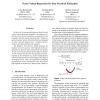Free Online Productivity Tools
i2Speak
i2Symbol
i2OCR
iTex2Img
iWeb2Print
iWeb2Shot
i2Type
iPdf2Split
iPdf2Merge
i2Bopomofo
i2Arabic
i2Style
i2Image
i2PDF
iLatex2Rtf
Sci2ools
ICPR
2008
IEEE
2008
IEEE
Vector valued regression for iron overload estimation
In this work we present and discuss in detail a novel vector-valued regression technique: our approach allows for an all-at-once estimation, as opposed to solve a number of scalar-valued regression tasks. Despite its general purpose nature, the method has been designed to solve a delicate medical issue: a reliable and noninvasive assessment of body-iron overload. The Magnetic Iron Detector (MID) measures the magnetic track of a person, which depends on the anthropometric characteristics and the body-iron burden. We aim to provide an estimate of this signal in absence of iron overload. We show how this question can be formulated as the estimation of a vector-valued function which encompasses the prior knowledge on the shape of the magnetic track. This is accomplished by designing an appropriate vector-valued feature map. We successfully applied the method on a dataset of 84 volunteers.
Computer Vision | ICPR 2008 | Magnetic Iron Detector | Magnetic Track | Scalar-valued Regression Tasks |
Related Content
| Added | 30 May 2010 |
| Updated | 30 May 2010 |
| Type | Conference |
| Year | 2008 |
| Where | ICPR |
| Authors | Luca Baldassarre, Annalisa Barla, Barbara Gianesin, Mauro Marinelli |
Comments (0)

